Overview
Launching a wine business with limited financial resources necessitates the development of a comprehensive business plan. This plan should:
- Clearly outline your vision
- Conduct thorough market research
- Establish a viable business model
- Include detailed financial projections
A well-structured plan is not just a formality; it is essential for attracting potential investors and navigating the intricate legal requirements of the industry. Furthermore, it is critical to emphasize the importance of:
- Quality
- Compelling storytelling
- Effective direct-to-consumer strategies
These elements are vital for building a successful brand in a highly competitive market. By prioritizing these aspects, you position your business to thrive and resonate with consumers.
Introduction
Starting a wine business may appear to be a venture reserved for those with substantial financial resources. However, the truth is that passion and strategic planning can pave the way for success, even in the absence of significant capital. This guide explores the essential steps that aspiring winemakers can take to launch their enterprises from the ground up. It focuses on:
- Crafting a robust business plan
- Navigating legal requirements
- Developing a compelling brand narrative
Yet, the journey is fraught with challenges—how can one effectively balance the pursuit of quality and authenticity while ensuring profitability in a competitive market?
Develop a Comprehensive Business Plan
- Define your vision and goals as you clearly articulate your aspirations for how to start a wine business with no money. Consider whether you want to specialize in a particular wine type, adopt a unique production method, or aim for a specific consumer segment. Successful winery owners emphasize the importance of having a well-defined vision to guide decision-making and inspire your team. Enocap's advisory services can assist you in creating an engaging brand story that connects with contemporary consumers, ensuring your heritage is flawlessly presented for today's environment. As James Elliott, a Partner at BPM, asserts, "The concept of inexpensive, bulk beverages as 'starter drinks' is a myth, and it’s likely a primary reason why younger individuals aren’t attracted to such products in general." This underscores the necessity of focusing on quality and authenticity in your vision.
- Conduct Market Research: Thoroughly analyze the beverage market to identify current trends, target demographics, and potential competitors. Understanding these factors will help you position your business effectively. For instance, the premium wine sector is expanding, with buyers increasingly choosing bottles priced at $20 and above, indicating a shift towards quality over quantity. This trend highlights the importance of aligning your business model with consumer preferences. Enocap's expertise in demand generation strategies can assist you in tapping into this burgeoning market.
- Outline Your Business Model: Determine your business structure—whether it will be a vineyard, beverage establishment, or focused on online sales. Clearly define how you will generate revenue, detailing your production methods, grape sourcing, and distribution channels. Understanding how to is crucial for navigating the complexities of the wine industry, particularly in light of evolving consumer habits. Enocap can provide insights into optimizing your direct-to-consumer channels and customer retention programs to drive consistent growth.
- Create Financial Projections: Estimate your startup costs, ongoing expenses, and revenue forecasts. This financial roadmap is essential for attracting investors or securing loans. Data indicates that vineyards with robust financial strategies are better equipped to handle economic variations, particularly as Direct-to-Consumer (DTC) sales in the U.S. face challenges. Enocap's strategic capital planning services can help you identify the right partners and capital to support your growth, emphasizing the need for a solid financial strategy.
- Draft an Executive Summary: Summarize your business plan in a concise document that highlights the key points. This summary should capture your vision, market analysis, business model, and financial projections, making it easier for potential investors to quickly grasp your business concept. As noted by successful vineyard proprietors, a persuasive executive summary can be the difference between securing funding and missing out on opportunities. Enocap's experience in media placement and PR can further enhance your visibility to potential investors.
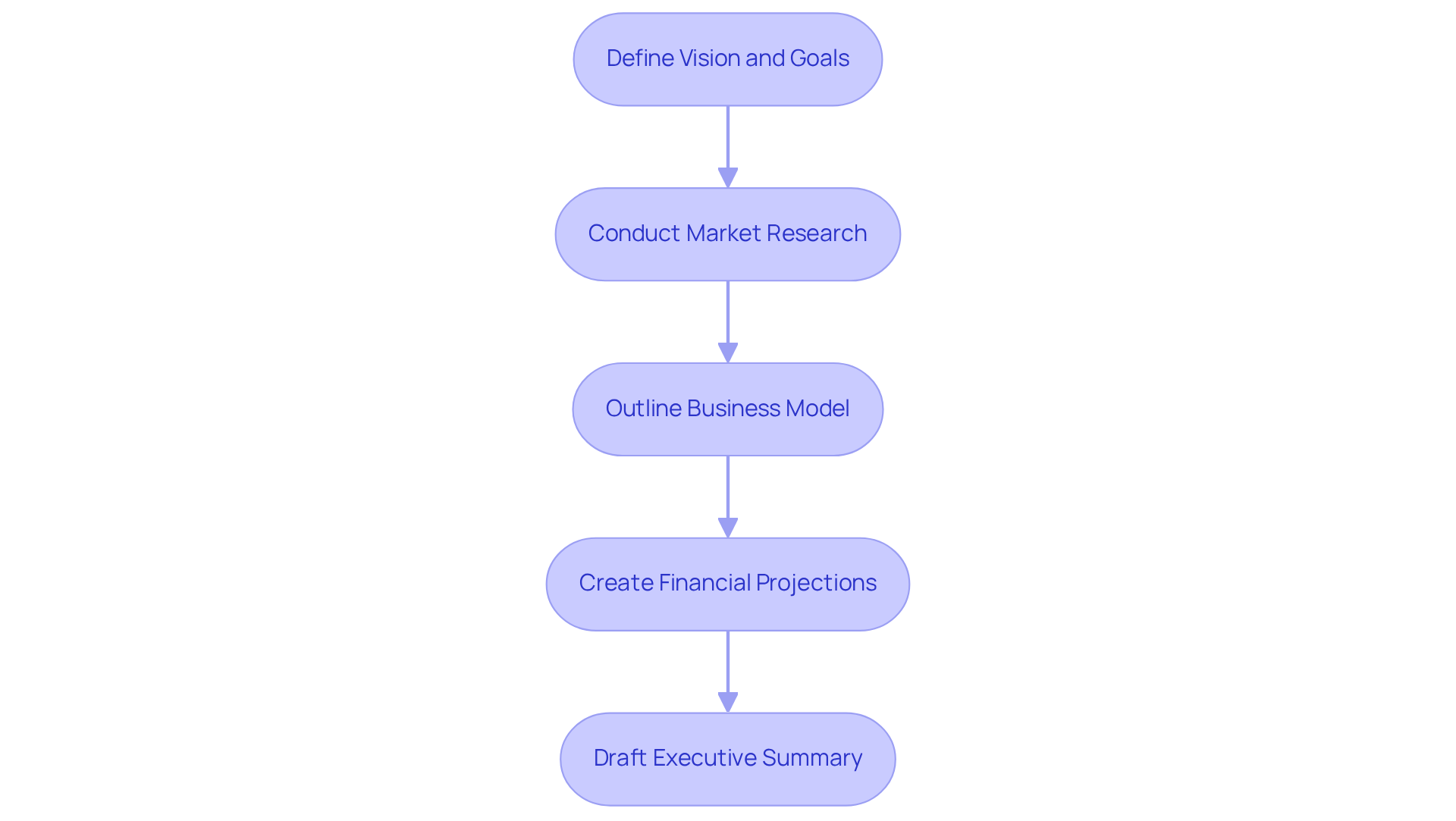
Understand Legal Requirements and Licensing
- Research Federal Regulations: Begin by familiarizing yourself with the requirements set forth by the Alcohol and Tobacco Tax and Trade Bureau (TTB) for operating a wine business. Securing a basic permit is essential for legal operation, and a thorough understanding of is crucial for compliance.
- Obtain State Licenses: Licensing requirements differ significantly by state. It is imperative to consult your state's Alcoholic Beverage Control (ABC) agency to identify the specific permits necessary for legal alcohol sales and distribution.
- Local Permits: Beyond state licenses, local permits may also be required. This can encompass zoning permits, health department approvals, and adherence to other local regulations that ensure your establishment meets community standards.
- Label Approval: Compliance with TTB regulations extends to your product labels. It is vital to ensure that your beverage labels adhere to all necessary guidelines and receive approval prior to marketing your products, thereby avoiding potential legal complications.
- Stay Informed: The regulatory landscape is ever-evolving, with laws and requirements subject to change. Regularly reviewing updates from the TTB and local authorities is essential to ensure ongoing compliance and to adapt your business practices accordingly.
- Consider Financial Investment: Be cognizant that launching a vineyard necessitates a substantial financial commitment, with estimates suggesting that over $1.5 million may be required within the initial five years. Enocap's strategic capital advisory services can help you navigate tailored debt, equity, and acquisition solutions, especially when considering how to start a wine business with no money to effectively support your financial planning.
- Maintain Compliance Records: It is crucial to keep detailed records for compliance with TTB regulations and local laws. This includes documentation related to production, sales, and any chemicals or additives utilized in your wine.
- Consult Legal Experts: Navigating the complexities of licensing and regulatory compliance can be daunting. Consulting a lawyer with expertise in vineyard operations is advisable to ensure that you meet all legal requirements.
- A well-structured business plan is vital for securing financing and outlining your operational strategy on how to start a wine business with no money. It should encompass market analysis, financial forecasts, and a clear plan for your establishment's growth. Incorporating direct-to-consumer strategies, brand storytelling, and customer loyalty initiatives into your business plan can further enhance your winery's appeal and ensure sustainable growth.
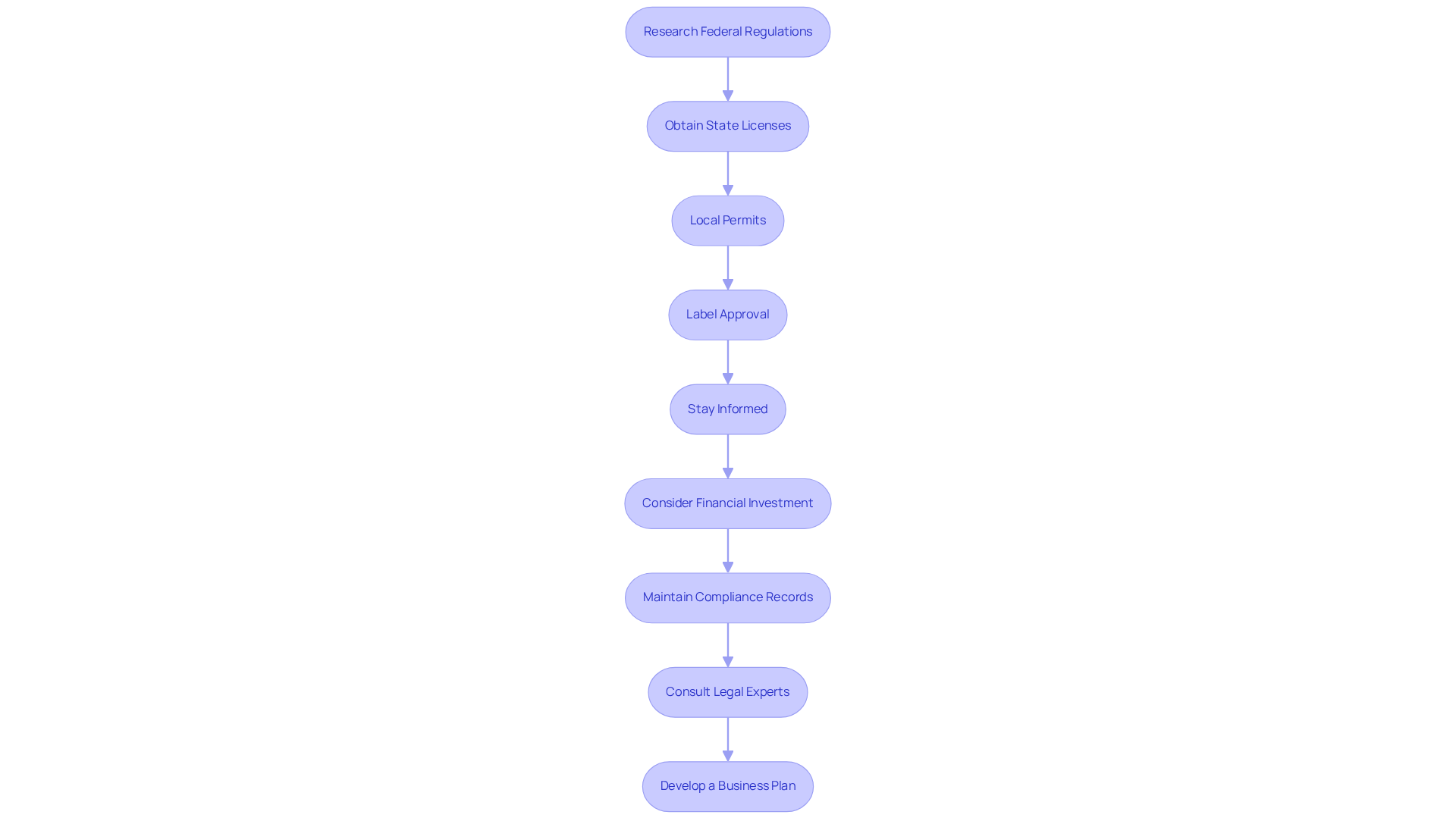
Choose Your Wine Production Method
- Decide on winemaking style by understanding how to start a wine business with no money, which involves choosing between traditional methods like hand-harvesting and natural fermentation and modern techniques such as mechanized harvesting and cultured yeasts. Each approach carries distinct advantages and disadvantages that can significantly shape your brand narrative and customer engagement. Enocap underscores the necessity of crafting a compelling narrative around your winemaking style to effectively attract and retain customers.
- Sourcing Grapes: Next, evaluate whether to cultivate your own grapes or procure them from local vineyards. It's crucial to consider how to start a wine business with no money, along with the associated costs and logistics of each option. This decision not only impacts production but also influences your direct-to-consumer strategy. Sourcing locally can enhance your brand's story and appeal to consumers seeking authenticity. Establishing partnerships with local growers can further optimize your sourcing decisions.
- Cost Analysis: Conduct a thorough financial analysis of how to start a wine business with no money. When considering how to start a wine business with no money, it's important to recognize that growing grapes entails upfront costs for land preparation, planting, and maintenance, which can vary significantly based on location and vineyard size. Conversely, when considering how to start a wine business with no money, purchasing grapes may incur variable costs influenced by market conditions and quality, making it essential to cultivate reliable supplier relationships.
- Production Scale: Assess your initial production goals. This assessment will determine your equipment requirements and operational setup. A well-planned production scale is vital for establishing sustainable direct-to-consumer channels that foster consistent growth, as highlighted by Enocap's strategic advisory services.
- Quality Control: Implement rigorous quality control measures throughout the production process to ensure consistency and uphold high standards in your wine. Maintaining quality is crucial for converting casual buyers into dedicated club members, a strategy that Enocap actively supports for family-owned vineyards.
- Experimentation: Embrace the opportunity to experiment with diverse techniques and blends to discover your unique flavor profile that resonates with your target audience. Enocap encourages producers to innovate, as this can lead to captivating narratives that connect with consumers and enhance your brand's market presence.
- Strategic Capital Planning: Finally, consider how to start a wine business with no money in your financial strategy for funding your vineyard. Whether through debt, equity, or acquisition opportunities, a is essential for sustainable growth and operational success.
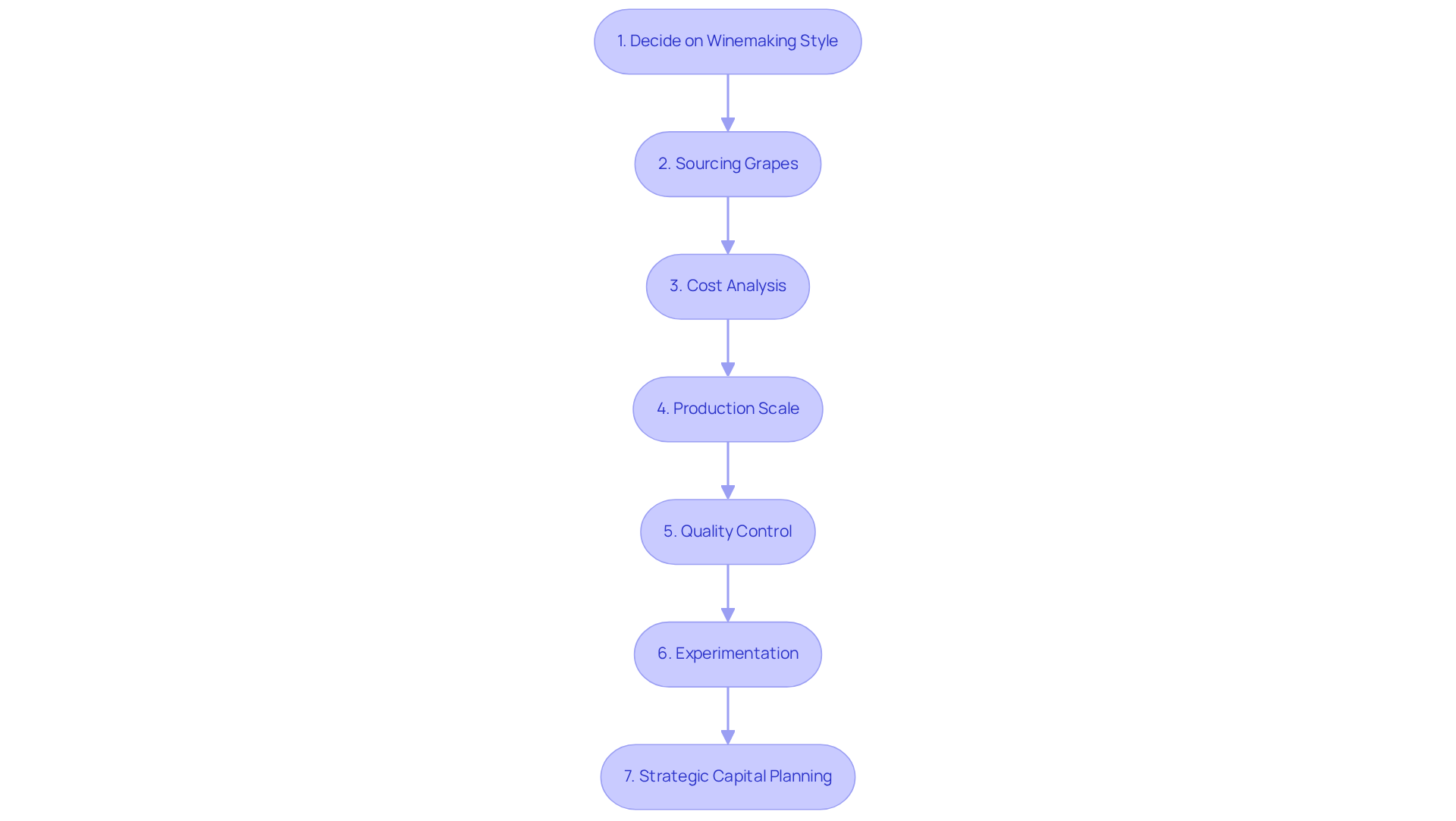
Craft Your Brand Story and Marketing Strategy
- Define Your Brand Identity: Establish what distinguishes your product. This could encompass your unique production methods, the narrative behind your vineyard, or a strong commitment to sustainability. Understanding how to requires a clearly defined brand identity, as it aids in distinguishing your winery in a competitive market where 27% of new club signups now come through digital channels.
- Create a Compelling Narrative: Craft a brand story that resonates deeply with your audience. Share your journey, core values, and the inspirations behind your winemaking. Engaging narratives can significantly enhance customer connection, as emotional storytelling is a powerful marketing tool that fosters loyalty and trust. Consider incorporating actionable storytelling frameworks from Kindra Hall's book 'Stories That Stick,' such as writing a value story, a founder story, a purpose story, and a customer story to structure your narrative effectively. This approach aligns with Enocap's focus on crafting stories that sell, which can transform casual buyers into loyal club members.
- Develop a Marketing Plan: Formulate a comprehensive marketing strategy that includes social media, email campaigns, and events. Concentrate on creating a community surrounding your brand, especially when considering how to start a wine business with no money, as successful marketing activities are crucial for visibility and conveying your product's exclusivity. Understanding consumer preferences is vital, especially as younger audiences increasingly prioritize sustainability and innovation. Additionally, consider strategic capital planning to support your marketing initiatives while learning how to start a wine business with no money to ensure sustainable growth.
- Engage with Consumers: Utilize storytelling in your marketing materials to forge emotional connections with your customers. Highlight the experiences and values your beverage embodies. Incorporating testimonials and real-world examples can enhance credibility and appeal, making your brand more relatable. As Kindra Hall emphasizes, seek out customer comments or solicit testimonials from your brand ambassadors to enrich your customer stories. This aligns with Enocap's mission to enhance vineyard growth through compelling storytelling.
- Leverage Digital Channels: Maximize online platforms to expand your reach. Create a dynamic website that serves as a compelling digital representation of your story, and engage actively on social media. E-commerce solutions can facilitate direct-to-consumer sales, which have observed notable growth, with online buyers of beverages increasing from 1.5 million to 4.1 million recently. By incorporating distinctive features into your storytelling across all platforms, you can celebrate your establishment's individuality and enhance brand identity. Additionally, enhancing your website with dynamic content can improve storytelling and user engagement, further supporting your direct-to-consumer strategies.
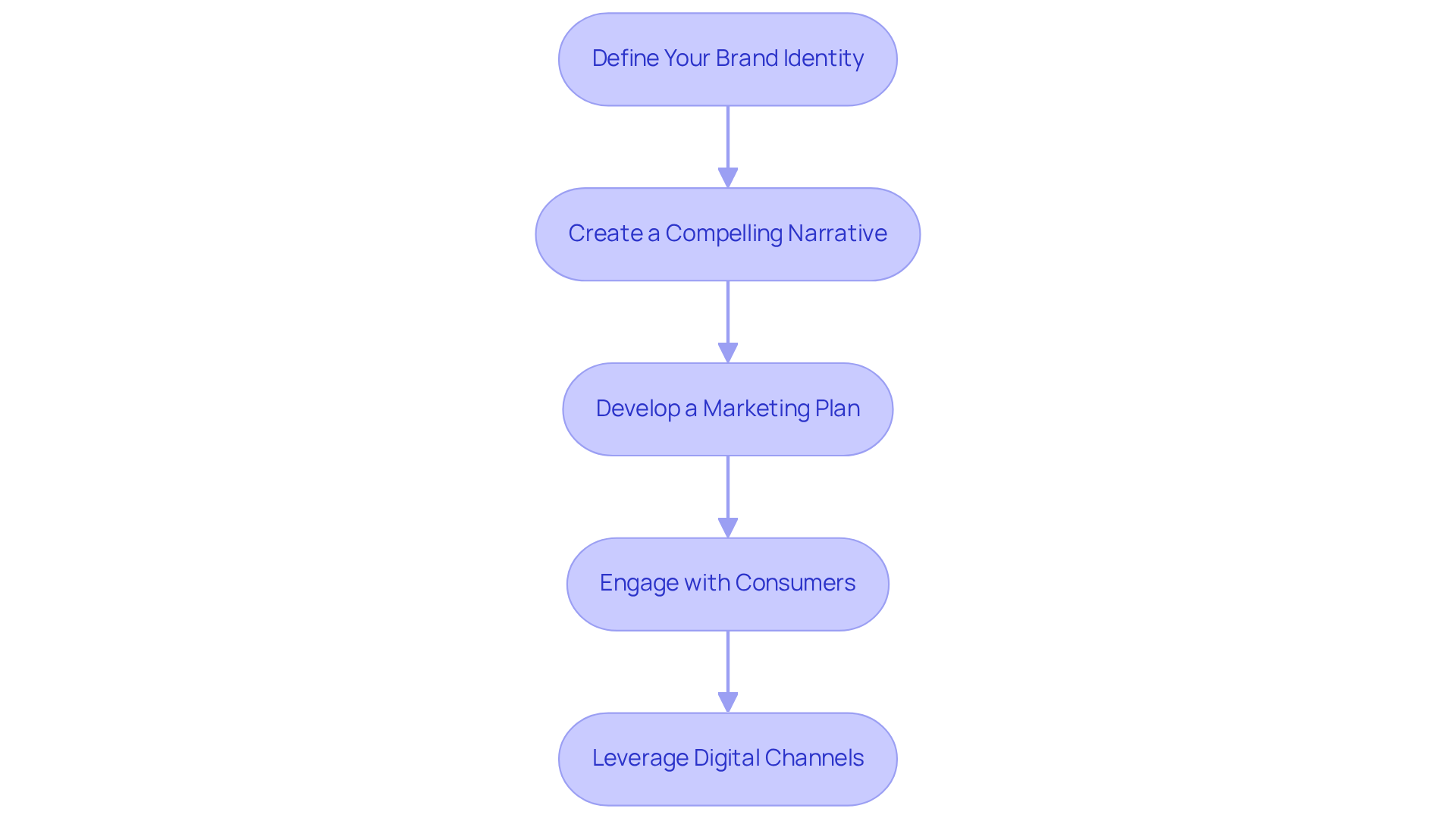
Set Up Effective Sales Channels
- Direct-to-Consumer Sales: Focus on cultivating a robust direct-to-consumer (DTC) sales strategy through your website and club memberships. This approach not only allows you to engage directly with customers but also enables you to retain a larger share of profits. By transforming casual buyers into dedicated club members, you can ensure sustainable growth for your winery.
- Retail Partnerships: Forge strong relationships with local beverage shops and restaurants to feature your products. Collaborations with esteemed local eateries can significantly enhance brand visibility and attract new patrons, extending your reach beyond traditional beverage sectors.
- Online Marketplaces: Explore the opportunity to list your products on dedicated online platforms that specialize in alcohol sales. The global online beverage sales market is projected to experience substantial growth, expected to reach approximately USD 40.24 billion by 2032, fueled by the rise of mobile commerce and consumer preferences for convenient shopping experiences.
- Events and Tastings: Host tastings and participate in local events to showcase your products. This not only drives sales but also and fosters customer loyalty. Crafting engaging narratives about your beverages can further enhance audience engagement and connection.
- Monitor Sales Performance: Consistently analyze your sales data to identify which channels yield the best performance. Adjust your strategies as needed to optimize revenue, particularly as the wine market adapts to evolving consumer preferences. It is crucial to remain flexible, given the industry's current challenges, including a 2.1% decline in growth across all DTC channels in 2023. Furthermore, securing adequate capital for debt, equity, or acquisition opportunities will be vital in effectively navigating these challenges.
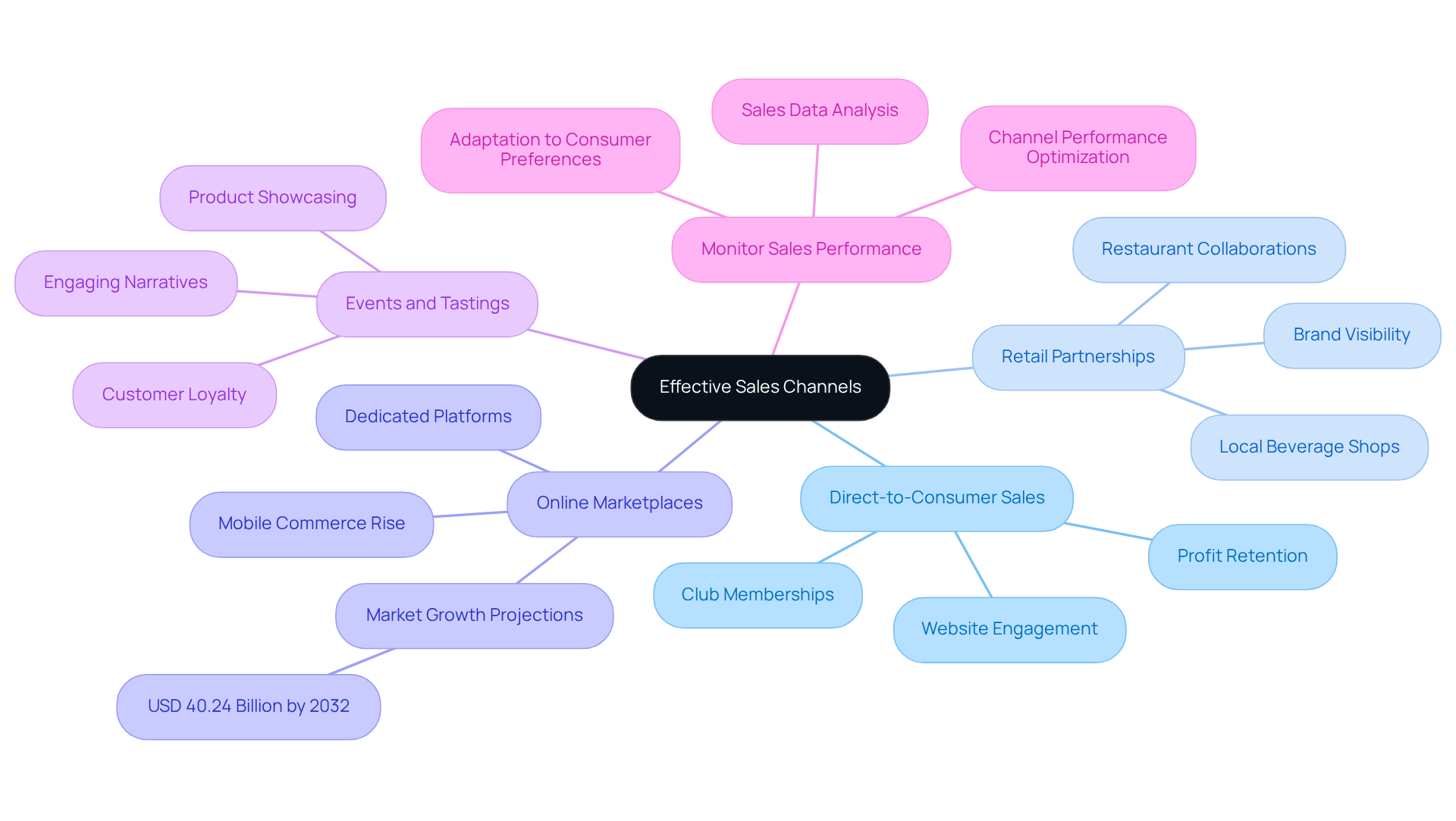
Conclusion
Starting a wine business with minimal capital is both challenging and achievable. By adopting a structured approach—defining a clear vision, conducting thorough market research, and comprehending legal requirements—aspiring entrepreneurs can establish a solid foundation for their venture. Prioritizing quality and authenticity in production methods, alongside crafting a compelling brand story, can significantly elevate market appeal and foster customer loyalty.
Key insights from this guide underscore the necessity of a comprehensive business plan, encompassing financial projections, marketing strategies, and effective sales channels. Engaging directly with consumers through innovative marketing and leveraging digital platforms can forge lasting connections and drive sustainable growth. Additionally, grasping the intricacies of legal compliance and capital planning is essential for navigating the complexities of the wine industry.
The journey to establishing a successful wine business transcends merely creating a product; it involves building a brand that resonates with consumers. As the market evolves, embracing innovative strategies and remaining adaptable will be crucial for success. Whether through direct-to-consumer sales or strategic partnerships, the potential for growth in the wine industry remains robust. For those prepared to embark on this path, now is the time to take action and transform your vision into reality.
Frequently Asked Questions
What are the key components of a comprehensive business plan for starting a wine business?
A comprehensive business plan should include a defined vision and goals, market research, a clear business model, financial projections, and an executive summary that captures all key points.
How important is market research when starting a wine business?
Market research is crucial as it helps identify current trends, target demographics, and potential competitors, allowing you to position your business effectively in the expanding premium wine sector.
What should be considered when outlining a business model for a wine business?
You should determine your business structure (vineyard, beverage establishment, or online sales), define revenue generation methods, and understand production methods, grape sourcing, and distribution channels.
Why are financial projections important for a wine business?
Financial projections are essential for estimating startup costs, ongoing expenses, and revenue forecasts, which are critical for attracting investors or securing loans.
What are the legal requirements for operating a wine business?
Legal requirements include securing a basic permit from the Alcohol and Tobacco Tax and Trade Bureau (TTB), obtaining state licenses, local permits, ensuring label approval, and maintaining compliance with all regulations.
How can I stay informed about changes in legal regulations for my wine business?
Regularly review updates from the TTB and local authorities to ensure ongoing compliance with evolving laws and requirements.
What financial commitment is typically required to launch a vineyard?
Launching a vineyard may require a substantial financial commitment, with estimates suggesting over $1.5 million may be needed within the initial five years.
Why is it advisable to consult legal experts when starting a wine business?
Consulting a lawyer with expertise in vineyard operations can help navigate the complexities of licensing and regulatory compliance, ensuring that all legal requirements are met.
How can a well-structured business plan enhance the appeal of a winery?
A well-structured business plan can secure financing and outline operational strategies, while incorporating direct-to-consumer strategies, brand storytelling, and customer loyalty initiatives can enhance the winery's appeal and support sustainable growth.




